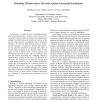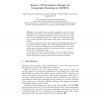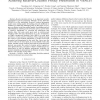11 search results - page 2 / 3 » Protecting Location Privacy in Sensor Networks against a Glo... |
ICDCS
2007
IEEE
13 years 11 months ago
2007
IEEE
Although the content of sensor messages describing “events of interest” may be encrypted to provide confidentiality, the context surrounding these events may also be sensitiv...
ESORICS
2010
Springer
13 years 5 months ago
2010
Springer
We present a novel hybrid communication protocol that guarantees mobile users' k-anonymity against a wide-range of adversaries by exploiting the capability of handheld devices...
MDM
2010
Springer
13 years 6 months ago
2010
Springer
In this paper, we study the issue of defending against adversarial localization in wireless sensor networks. Adversarial localization refers to attacks where an adversary attempts...
ESAS
2006
Springer
13 years 8 months ago
2006
Springer
Inter-vehicle communication is regarded as one of the major applications of mobile ad hoc networks (MANETs). In these so called vehicular ad hoc networks (VANETs) security and priv...
INFOCOM
2011
IEEE
12 years 8 months ago
2011
IEEE
—Receiver-location privacy is an important security requirement in privacy-preserving Vehicular Ad hoc Networks (VANETs), yet the unavailable receiver’s location information ma...



